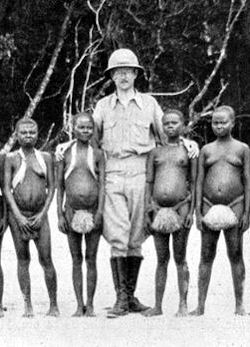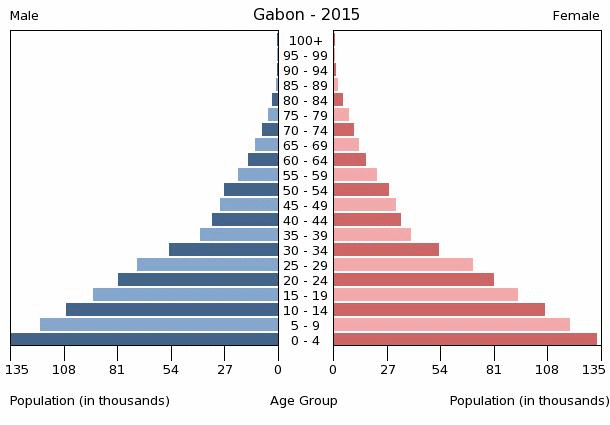Gabon - People
Gabon is one of the least densely inhabited countries in Africa, with a population that is estimated at 1,545,255. Almost all Gabonese are of Bantu origin. Gabon has at least 40 ethnic groups, with separate languages and cultures. The largest ethnicity is the Fang (about 30%). Other ethnic groups include the Nzebi, Myene, Bandjabi, Eshira, Bapounou, Bateke/Obamba, and Bakota.
Libreville is the largest city in Gabon with an estimated population of about 650,000 people. Port-Gentil is the second largest city with a prominent seaport; it is an island that is surrounded by swamps and ocean but it is notably known for being the nation’s oil capital. The third largest city and the birthplace of the late, former President Omar Bongo-Ondimba is Franceville; it is also the head of the Trans-Gabonese Railway. A popluar vacation spot is Mouila; it is famously known for its Lac Bleu, a lake known for its bright, beautiful blue water.
Ethnic group boundaries are less sharply drawn in Gabon than elsewhere in Africa. Most ethnicities are spread throughout Gabon, leading to constant contact and interaction among the groups. Intermarriage between the ethnicities is quite common, helping reduce ethnic tensions. French, the official language, is a unifying force. The Democratic Party of Gabon's historical dominance also has served to unite various ethnicities and local interests into a larger whole.
More than 10,000 native French live in Gabon, including an estimated 2,000 dual nationals. France dominates foreign cultural and commercial influences.
The Bantu-speaking group originated from the area that today is the Nigeria-Cameroon border. A series of migrations of Bantu-speaking groups began in the 16th century and continued through the present era. Villages relocated over many decades, resulting in Gabon’s current ethnic makeup. In the 19th century, migrations accelerated southward and westward in response to increased opportunities for exchanges with European traders. In the 20th century, colonial rule initiated labor migrations to colonial towns and lumber and mining camps in the south and west. Today, as a result of these migrations, Bantu-speaking groups dominate the Gabonese population. Key Bantu-speaking groups include the Fang, Myené, Nzébi, Mpongwé, Teke, Punu, and Obamba.
The Fang is the largest ethnic group and makes up more than one-fifth of the Gabonese population. The largest Fang populations live in Libreville and the Estuary region along the coast. Many also reside in the Woleu N’Tem region in the north, which is known for its agricultural productivity, most notably its coffee plantations. The Fang also have a significant presence in both neighboring Cameroon and Equatorial Guinea. Many Fang claim to have an ancient East African or Egyptian origin. While contemporary scholars contest these findings, during the colonial period, many scholars argued in favor of these origins. Many Fang believe these roots lend them prestige.
Despite the generally good ethnic relations among the Gabonese, tension does exist between many Fang and other ethnic groups. In general, non-Fang communities fear that the Fang will gain too much political power. The Fang, for their part, are somewhat disgruntled by their continuous characterization as the opposition group in the national government. Many Fang believed that when President Omar Bongo Ondimba, an ethnic Téké, died, it was time for a Fang president to be elected. They were dissatisfied when Ali Ben Bongo Ondimba, Omar Bongo Ondimba’s son, came to power. However, some Fang support the Bongos and remain loyal to their political party.
The President Bongo Ondimba and his son Ali Ben Bongo Ondimba are members of the Téké ethnic group, which, like the Fang, is a Bantu-speaking group. They are also natives of the relatively marginal Haut-Ogoué province. The Téké is a minority group in Gabon, although significant Téké communities reside in neighboring Congo. As a member of this minority group, President Bongo had to form a coalition of ethnic groups to counter the power and influence of the numerically dominant Fang. Even so, this ruling coalition has made concessions to the Fang, such as nominating a Fang from the Estuary region as the prime minister.
The Fang, who at 30 percent of the population comprise the largest ethnic group in Gabon, have been at the center of campaigns to promote Fang pride and candidates. There are a number of factors that keep the Fang from dominating the political scene in Gabon, including the Omar Bongo legacy of dispersing government and business positions among all ethnic groups. Fang dominance was not an overwhelming election factor in 2009 because of the large number of Fang candidates (almost one half of all 23 candidates are Fang), and repeated requests by government officials and candidates to keep ethnicity out of the election.
 Pygmies were perhaps the earliest inhabitants of Gabon; however, only a few thousand Pygmies remain in the country. The most well-known Pygmy groups are the Baka, Babongo, Bakola, Bagama, and Barimba. They resided primarily in rural areas and made their living through hunting and gathering. They also traded with local farmers, providing them natural goods, such as meat and honey, in exchange for agricultural and manufactured goods, such as food, cloth, weapons, and cigarettes. Although Pygmies are historically nomadic, government pressure in recent years has led many Pygmy groups to settle in semi-permanent villages, often alongside Bantu villages. Permanent settlement has led to greater assimilation with farming communities and the loss of some traditional Pygmy practices. For example, Pygmy children are encouraged to speak local Bantu languages rather than Pygmy languages. Today, Pygmies are beginning to engage in paid labor, and their participation in traditional forest activities is declining. However, a lack of education limits Pygmy migration to urban areas.
Pygmies were perhaps the earliest inhabitants of Gabon; however, only a few thousand Pygmies remain in the country. The most well-known Pygmy groups are the Baka, Babongo, Bakola, Bagama, and Barimba. They resided primarily in rural areas and made their living through hunting and gathering. They also traded with local farmers, providing them natural goods, such as meat and honey, in exchange for agricultural and manufactured goods, such as food, cloth, weapons, and cigarettes. Although Pygmies are historically nomadic, government pressure in recent years has led many Pygmy groups to settle in semi-permanent villages, often alongside Bantu villages. Permanent settlement has led to greater assimilation with farming communities and the loss of some traditional Pygmy practices. For example, Pygmy children are encouraged to speak local Bantu languages rather than Pygmy languages. Today, Pygmies are beginning to engage in paid labor, and their participation in traditional forest activities is declining. However, a lack of education limits Pygmy migration to urban areas.
Vastly outnumbered by Bantu-speaking peoples, Pygmies believe they have been politically, culturally, and economically marginalized. Pygmies are paradoxically both revered and scorned by other Gabonese. Pygmies are strongly associated with elements of nature and are well known for their knowledge of the forest, particularly their familiarity with the mystical forces believed to reside in the forest. Pygmies are also well known for their knowledge and skills related to medicine and healing, highly guarded practices within the Gabonese culture. At the same time, the Gabonese view Pygmies as uneducated, uncivilized, and inferior. Pygmies are often thought of as less than human and are usually considered the “property” of the nearest farming groups.

|
NEWSLETTER
|
| Join the GlobalSecurity.org mailing list |
|
|
|

